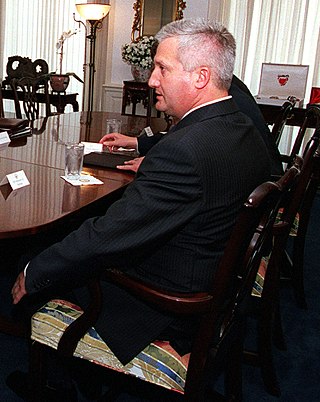Related Research Articles

Parliamentary elections to elect all 151 members of the Croatian Parliament were held on 23 November 2003. They were the fifth parliamentary elections to take place since the first multi-party elections in 1990. Voter turnout was 61.7%. The result was a victory for the opposition Croatian Democratic Union (HDZ) which won a plurality of 66 seats, but fell short of the 76 needed to form a government. HDZ chairman Ivo Sanader was named the eighth Prime Minister of Croatia on 23 December 2003, after parliament passed a confidence motion in his government cabinet, with 88 MPs voting in favor, 29 against and 14 abstaining. The ruling coalition going into the elections, consisting of the Social Democratic Party (SDP), Croatian People's Party (HNS), Croatian Peasant Party (HSS), Party of Liberal Democrats (Libra) and the Liberal Party (LS), did not contest the elections as a single bloc; the SDP ran with the Istrian Democratic Assembly (IDS), the Party of Liberal Democrats (Libra) and the Liberal Party, HNS ran with the Alliance of Primorje-Gorski Kotar (PGS) and the Slavonia-Baranja Croatian Party (SBHS), while HSS ran on its own.

The Independent Democratic Serb Party is a social-democratic political party in Croatia representing the interests of the Croatian Serbs. It holds, progressive, pro-European stances and is generally considered a centre-left party.

The Croatian Parliament or the Sabor is the unicameral legislature of Croatia. Under the terms of the Croatian Constitution, the Sabor represents the people and is vested with legislative power. The Sabor is composed of 151 members elected to a four-year term on the basis of direct, universal and equal suffrage by secret ballot. Seats are allocated according to the Croatian Parliament electoral districts: 140 members of the parliament are elected in multi-seat constituencies. An additional three seats are reserved for the diaspora and Croats in Bosnia and Herzegovina, while national minorities have eight places reserved in parliament. The Sabor is presided over by a Speaker, who is assisted by at least one deputy speaker.

The Liberal Party was a Croatian social-liberal political party active between January 1998 and April 2006. During its existence the party ran in two general elections and in each election won two seats in the 151-seat Sabor. LS was a member of Liberal International and the European Liberal Democrat and Reform Party. Its last leader was Zlatko Benašić.
LIBRA - Party of Liberal Democrats was a short-lived Croatian social-liberal political party active between September 2002 and August 2005. During its existence the party ran in only one parliamentary election, in 2003, and won three seats in the 151-seat 5th Assembly of the Croatian Parliament.
Ivo Banac was a Croatian-American historian, a professor of European history at Yale University and a politician of the former Liberal Party in Croatia, known as the Great Bard of Croatian historiography. As of 2012, Banac was a consultant for the Bosnian Institute. He died after a serious illness at age 73.
Zlatko Tomčić is a Croatian politician who served as President of the Croatian Peasant Party from 1994 to 2005, as Speaker of the Croatian Parliament from 2000 to 2003, as a representative in the Croatian Parliament, and as acting President of Croatia in February 2000.

Zlatko Mateša is a Croatian politician who served as Prime Minister of Croatia from 1995 to 2000. A member of the Croatian Democratic Union, Mateša is currently the president of the Croatian Olympic Committee and honorary consul of Mongolia in Croatia.
Zlatko Kramarić is a Croatian liberal politician from Osijek.
Branimir Glavaš is a Croatian retired major general and politician. He was one of the founders of the Croatian Democratic Union (HDZ) party which was in power in the 1990s and one of its key figures until a split in 2006.
Ivan Čehok is a Croatian politician who served as mayor of Varaždin from 2001 to 2011, and from 2017 to 2021. He was a prominent member of the Croatian Social Liberal Party (HSLS).

The Mayor of the City of Split, colloquially the Poteštat, is the highest official of the Croatian city of Split. From 1990 to 2007 the mayor was elected by the city assembly. Since 2007 Croatian mayors have been elected directly by the citizens. The first such election in Split occurred in 2009.

Ivo Josipović is a Croatian academic, jurist, composer, and politician who served as President of Croatia from 2010 to 2015.
The Croatian Parliament electoral districts are the special territorial subdivision of Croatia used for the country's parliamentary elections.

The Seventh Government of the Republic of Croatia was the first of two Croatian Government cabinets led by Prime Minister Ivica Račan. It was appointed on 27 January 2000 by a decree of the Acting President of the Republic and Speaker of Parliament, Vlatko Pavletić. The cabinet was confirmed by a parliamentary vote of confidence in the Chamber of Representatives on 2 February 2000, with 122 of 151 Members of Parliament voting for, 1 against and 1 abstaining. Its term ended on 30 July 2002, when it was reconstructed and replaced by Cabinet of Ivica Račan II. The cabinet was formed following the 2000 parliamentary elections, in which the centre-right party Croatian Democratic Union (HDZ) was defeated by a broad coalition of several centre-left parties. This marked an end to HDZ's dominance in Croatian politics since the first multi-party election in 1990. However, the period under Prime Minister Račan was marred with constant disagreements among coalition members, which later led to some parties leaving the ruling coalition. This ultimately paved the way for HDZ's return to power in the 2003 parliamentary elections.

The Eight Government of the Republic of Croatia was the second of two Croatian Government cabinets led by Prime Minister Ivica Račan. It was announced on 30 July 2002 and its term ended on 23 December 2003. Račan's second cabinet was formed after Croatian Social Liberal Party (HSLS) and Istrian Democratic Assembly (IDS) had decided to leave the ruling six-party coalition. The cabinet was succeeded by Cabinet of Ivo Sanader I, following the centre-right Croatian Democratic Union's return to power in the 2003 parliamentary elections.

Pavao Miljavac was a Croatian Army general.

Parliamentary elections were held in Croatia on 8 November 2015. All 151 seats in the Parliament were up for election. This parliamentary election was the 8th since the first multi-party election in 1990 and the first since Croatia joined the European Union in 2013. The ruling center-left Croatia is Growing coalition, led by Prime Minister Zoran Milanović, was challenged by the center-right Patriotic Coalition led by the HDZ and headed by its party chairman Tomislav Karamarko, and also faced several new political coalitions.

Parliamentary elections were held in Croatia on 5 July 2020. They were the tenth parliamentary elections since the first multi-party elections in 1990 and elected the 151 members of the Croatian Parliament. 140 Members of Parliament were elected from geographical electoral districts in Croatia, three MPs were chosen by the Croatian diaspora and eight MPs came from the ranks of citizens registered as belonging to any of the 22 constitutionally recognized national minorities.
Robert Podolnjak is a Croatian associate professor of constitutional law and politician who served as chairman of the Croatian Parliament's Committee on the Constitution, Standing Orders and Political System between January 2016 and June 2017. Podolnjak was elected to the Croatian Parliament at the 2015 and 2016 parliamentary elections as representative for III electoral district. He is member of the Bridge of Independent Lists party.
References
- ↑ "Prof. dr. sc. Vilim Herman, izvanredni profesor" (in Croatian). Pravni fakultet u Osijeku. Retrieved 2012-07-29.
- 1 2 "Vilim Herman - LIBRA". Zastupnici 4. saziva Hrvatskoga sabora (in Croatian). Croatian Parliament. Retrieved 2011-11-14.
- ↑ "Legos intervju - prof. dr. sc.Vilim Herman" (PDF). www.pravos.hr (in Croatian). Legos magazine.
- ↑ "To je odmazda voljenog vođe" (in Croatian). Slobodna Dalmacija. 2002-11-01. Retrieved 2013-01-16.
- ↑ "Službeni rezultati za izbor zastupnika u Zastupnički dom Sabora Republike Hrvatske sa državnih listi" (PDF) (in Croatian). Electoral Commission of the Republic of Croatia. 1992-08-10. Retrieved 2011-11-15.
- ↑ "Vilim Herman - SBHS". Zastupnici 5. saziva Hrvatskoga sabora (in Croatian). Croatian Parliament. Retrieved 2011-11-14.